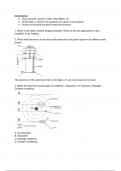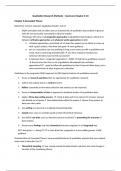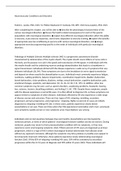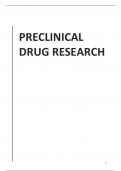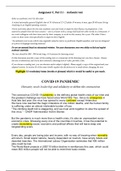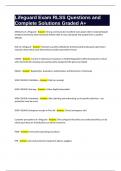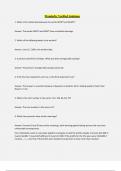2022
HOORCOLLEGES
BELEID &
POLITIEK
,HOORCOLLEGES
Hoorcollege 1
INTRODUCTIE SOCIAAL WETENSCHAPPELIJK ONDERZOEK NAAR
BELEIDSPROCESSEN
Beleid is bedoeld om gedrag te veranderen / aan te passen. Protesten kunnen
aanzetten tot (nieuw) beleid.
Wat is beleid? De inities
“… a course of action (or non-action) taken by a government or legislature with regard
to a particular issue” (Knill & Tosun 2012)
... a course of action or inaction rather than speci ic decisions or actions”
“... consist of a web of decisions and actions that allocate values”
“... a set of interrelated decisions ... concerning the selection of goals and the means
of achieving them within a speci ic situation ...”
Overeenkomsten de inities, 4 kenmerken:
1. Bewuste beslissing (geen ‘natuurlijke’ ontwikkeling)
Er is over nagedacht
2. Om te handelen of niets te doen
3. Keten van keuzes en handelingen
Samenwerking van verschillende beslissingen, het zijn meerdere acties in combinatie
in plaats van één besluit
4. Door de overheid (één of meerdere overheidsorganen)
Een poging van de overheid om gedrag te beïnvloeden.
Uiteindelijke doel: oplossen sociaal probleem via gedragsbeïnvloeding
Waarom beleid?
De poging moet leiden tot:
- Utopische visie: oplossen sociale problemen
- Dystopische visie: beheersingsbevolking en behoud bestaande maatschappelijke
orde.
Op welk niveau handelen? Individueel, groep of samenlevingsniveau
Conclusie wat is dan beleid en politiek? “Who gets what, when and how?”
1
,HOORCOLLEGES
Sociaal-democratische
Minimaal-a hankelijk van werk
Doelgroep; hele samenleving
Herverdeling; hoog
rechten;
Conservatieve
Medium-a hankelijk van werk
Doelgroep; werkende populatie
Herverdeling; status a hankelijk
rechten;
Markt, maar wel staatsingrijpen als het nodig is
Liberale
Maximaal-a hankelijk van werk
Doelgroep; alleen ondersteuning bij laag inkomen
Herverdeling;
rechten; gemiddelden-toets
Markt moet problemen oplossen
Wie wel of geen staatshulp krijgt hangt af van linksheid/rechtsheid van het land.
Er wordt beleid gemaakt op cohesie omdat de overheid wilt dat de cohesie en
solidariteit hoog is. Wijken waar de cohesie hoger is, is het veiliger.
Wanneer ongelijkheid te hoog is, wordt er beleid gemaakt. Omdat het negatieve
gevolgen heeft voor de gelijkwaardigheid en de cohesie.
Teveel ongelijkheid —> Kijken naar de gevolgen —> gevolgen te groot —> beleid.
2
, HOORCOLLEGES
Wat is politiek?
Combinatie van Polity (instituties; Tweede Kamer) & Politics (politieke praktijken;
stemmen).
Instituties zijn er om de orde te handgaven. Institute die individuen beschermt tegen.
Elkaar en die de sociale orde handhaaft. Dit wordt gedaan met wetten en beleid.
Wortels: subsidies
Stokken: boetes
Onderzoek naar beleid beleid te begrijpen, analyseren, wat het doet en wat het is
Wat beleid doet
Voorspellend (ex ante) onderzoek
Na a loop (ex post) e ectevaluatie door speciale evaluatiecommissie (zijn doelen
behaald, zijn er onbedoelde doelen)
Wat beleid is (beleidsvormingsproces)
Beleidscyclus
- Agenda setting
- Policy Formation
- Policy Implementation
- Evaluation
3
HOORCOLLEGES
BELEID &
POLITIEK
,HOORCOLLEGES
Hoorcollege 1
INTRODUCTIE SOCIAAL WETENSCHAPPELIJK ONDERZOEK NAAR
BELEIDSPROCESSEN
Beleid is bedoeld om gedrag te veranderen / aan te passen. Protesten kunnen
aanzetten tot (nieuw) beleid.
Wat is beleid? De inities
“… a course of action (or non-action) taken by a government or legislature with regard
to a particular issue” (Knill & Tosun 2012)
... a course of action or inaction rather than speci ic decisions or actions”
“... consist of a web of decisions and actions that allocate values”
“... a set of interrelated decisions ... concerning the selection of goals and the means
of achieving them within a speci ic situation ...”
Overeenkomsten de inities, 4 kenmerken:
1. Bewuste beslissing (geen ‘natuurlijke’ ontwikkeling)
Er is over nagedacht
2. Om te handelen of niets te doen
3. Keten van keuzes en handelingen
Samenwerking van verschillende beslissingen, het zijn meerdere acties in combinatie
in plaats van één besluit
4. Door de overheid (één of meerdere overheidsorganen)
Een poging van de overheid om gedrag te beïnvloeden.
Uiteindelijke doel: oplossen sociaal probleem via gedragsbeïnvloeding
Waarom beleid?
De poging moet leiden tot:
- Utopische visie: oplossen sociale problemen
- Dystopische visie: beheersingsbevolking en behoud bestaande maatschappelijke
orde.
Op welk niveau handelen? Individueel, groep of samenlevingsniveau
Conclusie wat is dan beleid en politiek? “Who gets what, when and how?”
1
,HOORCOLLEGES
Sociaal-democratische
Minimaal-a hankelijk van werk
Doelgroep; hele samenleving
Herverdeling; hoog
rechten;
Conservatieve
Medium-a hankelijk van werk
Doelgroep; werkende populatie
Herverdeling; status a hankelijk
rechten;
Markt, maar wel staatsingrijpen als het nodig is
Liberale
Maximaal-a hankelijk van werk
Doelgroep; alleen ondersteuning bij laag inkomen
Herverdeling;
rechten; gemiddelden-toets
Markt moet problemen oplossen
Wie wel of geen staatshulp krijgt hangt af van linksheid/rechtsheid van het land.
Er wordt beleid gemaakt op cohesie omdat de overheid wilt dat de cohesie en
solidariteit hoog is. Wijken waar de cohesie hoger is, is het veiliger.
Wanneer ongelijkheid te hoog is, wordt er beleid gemaakt. Omdat het negatieve
gevolgen heeft voor de gelijkwaardigheid en de cohesie.
Teveel ongelijkheid —> Kijken naar de gevolgen —> gevolgen te groot —> beleid.
2
, HOORCOLLEGES
Wat is politiek?
Combinatie van Polity (instituties; Tweede Kamer) & Politics (politieke praktijken;
stemmen).
Instituties zijn er om de orde te handgaven. Institute die individuen beschermt tegen.
Elkaar en die de sociale orde handhaaft. Dit wordt gedaan met wetten en beleid.
Wortels: subsidies
Stokken: boetes
Onderzoek naar beleid beleid te begrijpen, analyseren, wat het doet en wat het is
Wat beleid doet
Voorspellend (ex ante) onderzoek
Na a loop (ex post) e ectevaluatie door speciale evaluatiecommissie (zijn doelen
behaald, zijn er onbedoelde doelen)
Wat beleid is (beleidsvormingsproces)
Beleidscyclus
- Agenda setting
- Policy Formation
- Policy Implementation
- Evaluation
3

